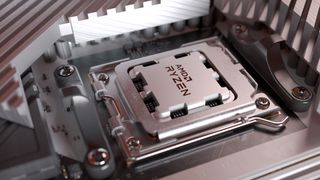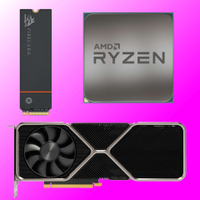AMD promises AM5 socket life support through to 2027 and beyond
It's got some way to beat the AM4 socket, which is still getting new chips, even now.

At Computex 2024, AMD announced its new Ryzen 9000 series of processors, all sporting the Zen 5 architecture. This is the second generation of CPUs that use the AM5 socket and one thing is clear: It's far from being the last to do so. In fact, AM5 will see new Ryzen models all the way through to 2027 and beyond, confirming AMD's commitment to socket longevity.
AM5 first saw the light of day at the CES 2022 event, before being given a thorough introduction at Computex 2022. Designing a socket to last for numerous generations of chips is no mean feat, as it not only needs to support current technologies but also those yet to be used, as well as the power and performance demands of the future.

The first processors to find a home in the little 40 x 40 mm socket—with its 1,718 contact pins—were all the Zen 4-powered Ryzen 7000 series, and now the latest Ryzen 9000 joins them. If you were a certain blue-themed chip company, you might squeeze one more generation of CPUs into the socket before designing a new one, but that's not the case here.
That's because AMD reaffirmed its commitment to using the same sockets for many years by announcing that AM5 will continue to see new Ryzen processors for another three years, to 2027, and beyond.
If one assumes that AMD can release a new series of CPUs every 20 months or so, then you're looking at another two generations of Ryzen, possibly three. Putting them all together, that would make the AM5 home to a total of four or five generations of processors.
That's roughly the same as the 'legendary' AM4—well, as far as Ryzen chips are concerned. The first processors to use that socket were some old A-series APUs and the last Athlon X4 models. It's been in use since 2016 and yet AMD is still releasing new CPUs for it, and may possibly do so for another year, making its lifespan a truly remarkable nine years.
I'll be very surprised if AM5 lasts as long as that, as the push to support ever-faster RAM and offer additional speedy PCIe lanes will require more contact pins than AM5 has to offer. But even if it does all end in 2028, for example, it'll be great news for anyone with a good AM5 motherboard at the moment, because you should be able to drop a new, faster CPU into it and enjoy a faster gaming PC whenever you like.
The biggest gaming news, reviews and hardware deals
Keep up to date with the most important stories and the best deals, as picked by the PC Gamer team.
Best CPU for gaming: Top chips from Intel and AMD.
Best gaming motherboard: The right boards.
Best graphics card: Your perfect pixel-pusher awaits.
Best SSD for gaming: Get into the game first.

Nick, gaming, and computers all first met in 1981, with the love affair starting on a Sinclair ZX81 in kit form and a book on ZX Basic. He ended up becoming a physics and IT teacher, but by the late 1990s decided it was time to cut his teeth writing for a long defunct UK tech site. He went on to do the same at Madonion, helping to write the help files for 3DMark and PCMark. After a short stint working at Beyond3D.com, Nick joined Futuremark (MadOnion rebranded) full-time, as editor-in-chief for its gaming and hardware section, YouGamers. After the site shutdown, he became an engineering and computing lecturer for many years, but missed the writing bug. Cue four years at TechSpot.com and over 100 long articles on anything and everything. He freely admits to being far too obsessed with GPUs and open world grindy RPGs, but who isn't these days?
Most Popular








